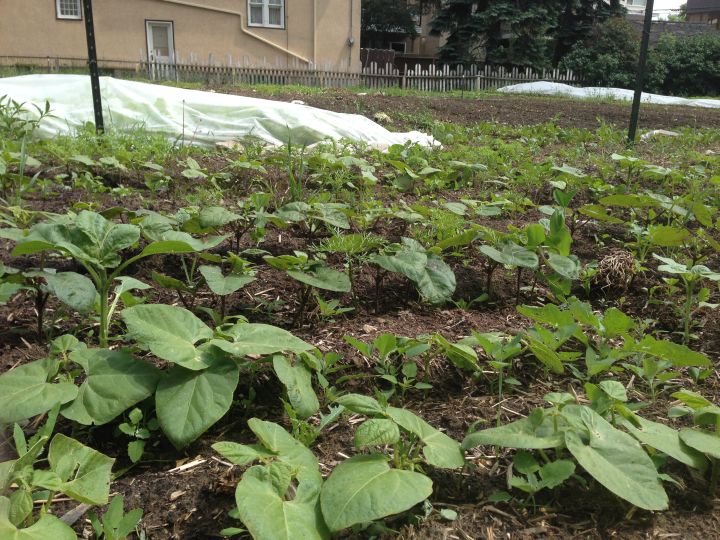WATCH ABOVE: Vinesh Pratap profiles a couple of Edmonton entrepreneurs who are working hard to put food on the table. And the way they’re doing it might surprise you.

EDMONTON – When many people think of farming, the city isn’t often the first location that comes to mind. But that’s exactly what a couple of Edmontonians are doing: urban farming.
“We started off just kind of dreaming up the idea while we were both in grad school, both studying food and agriculture-related topics,” said Cathryn Sprague, co-owner of Reclaim Urban Farm.
Sprague and her business partner, Ryan Mason, operate at 15 urban sites, mainly in the Whyte Avenue area. With permission from the property owners, the pair reclaims front and back yards, empty lots and gardens, and turns them into mini farm sites.
“Our business model is to turn under-utilized land into agriculturally-productive land,” said Mason.
READ MORE: Urban farming: not just growing food but communities
While they’ve nearly doubled their growing space in their second year of business, one of the challenges the urban farmers face is space.
“We’re small in comparison to other farms. We’re an acre maximum, in comparison to five, 10, 50, 160 acres, depending on the size of the farm,” said Mason.
For that reason, they mainly focus on high-intensity crops that harvest five to six times per year.
- Life in the forest: How Stanley Park’s longest resident survived a changing landscape
- Bird flu risk to humans an ‘enormous concern,’ WHO says. Here’s what to know
- More youth are seeking EI amid rising unemployment rates: StatCan
- Mental health support still lacking 4 years after mass shooting: Nova Scotia mayor
“We do mainly leafy greens: things like salad mix, spinach and arugula,” said Mason.
They also grow kale, summer squash and mint. This year they’re even trying celery.
“Just like any other farmer, we work up the land, plant our seeds, we grow them and then we sell them at the farmer’s market,” said Sprague.
And just like any farm, it’s hard work. Sprague and Mason work 10 to 12-hour days, six days a week. But while the days are long, they say their hard work is paying off.
“I knew it was going to be a challenge but it has surpassed my expectations,” said Mason.
“In our second year we’ve reached a good place. We’ve been able to pay off our assets and we’re paying ourselves a wage now,” said Sprague. “I think things are looking good for urban farming right now.
“There’s a ton of support in the community and it is a lot of work, but you can do well with it.”
Reclaim Urban Farm also sells its products to local restaurants.
With files from Vinesh Pratap, Global News.





















Comments